2 - ‘No way qualified for retirement’: disgrace
from Part I
Published online by Cambridge University Press: 05 August 2013
Summary
My sad Soul,
Has form'd a dismal melancholy Scene,
Such a Retreat as I wou'd wish to find
(Nicholas Rowe, The Fair Penitent, 1703)
In Addison's Spectator (of 1711), the ideal woman lives a life of quiet but admirable retirement in the country; her name is Aurelia. In The Weekly Journal or British Gazette (1720) the ‘innocently Guilty’ Aurelia is seduced and abandoned by a faithless lover, retires to a neighbouring wood where, weakened by lack of food, she watches her child's death and subsequent disfigurement by worms and vermin. Saved by a charitable country lady, she lives on as ‘a Melancholly Example of Injur'd Virtue, and a fair Landmark for other Maids to steer clear of the dangerous Rocks and Quicksands on which she so unhappily Split’. The choice of name may of course be no more than a coincidence, and the easy turn to the names of romance is nothing if not conventional; but what may also be a nod towards the mother of Julius Caesar, and to an ideal of matriarchal behaviour, should alert us once again to what is at stake when women are placed in a landscape which can speak of innocence and of sexuality, of piety, of punishment and of shame.
Domestic pleasure and pious retreat was the subject of my last chapter, but as we saw, even these visions of piety and ease carried the spectre of transgression, failure, and disgrace, and it is this alternative vision of the country, and the peculiar place of the garden, which is the subject of this chapter. My aim is to establish the ubiquity of this alternative account of the country and the range of genres in which retirement and transgression appear throughout the century; to establish the close ties between pastoral romance and transgression in the imagination of the country; to argue, along the way, that while critics have used the novel to chart the decline of romance, it remains powerfully alive in women's letters and in the imagination of rural space; and to demonstrate that models of disgrace and punishment are part of the mainstream cultural imagination of retirement quite as much as those more cheery idylls of country pleasure outlined in the previous chapter.
- Type
- Chapter
- Information
- Green RetreatsWomen, Gardens and Eighteenth-Century Culture, pp. 92 - 132Publisher: Cambridge University PressPrint publication year: 2013

